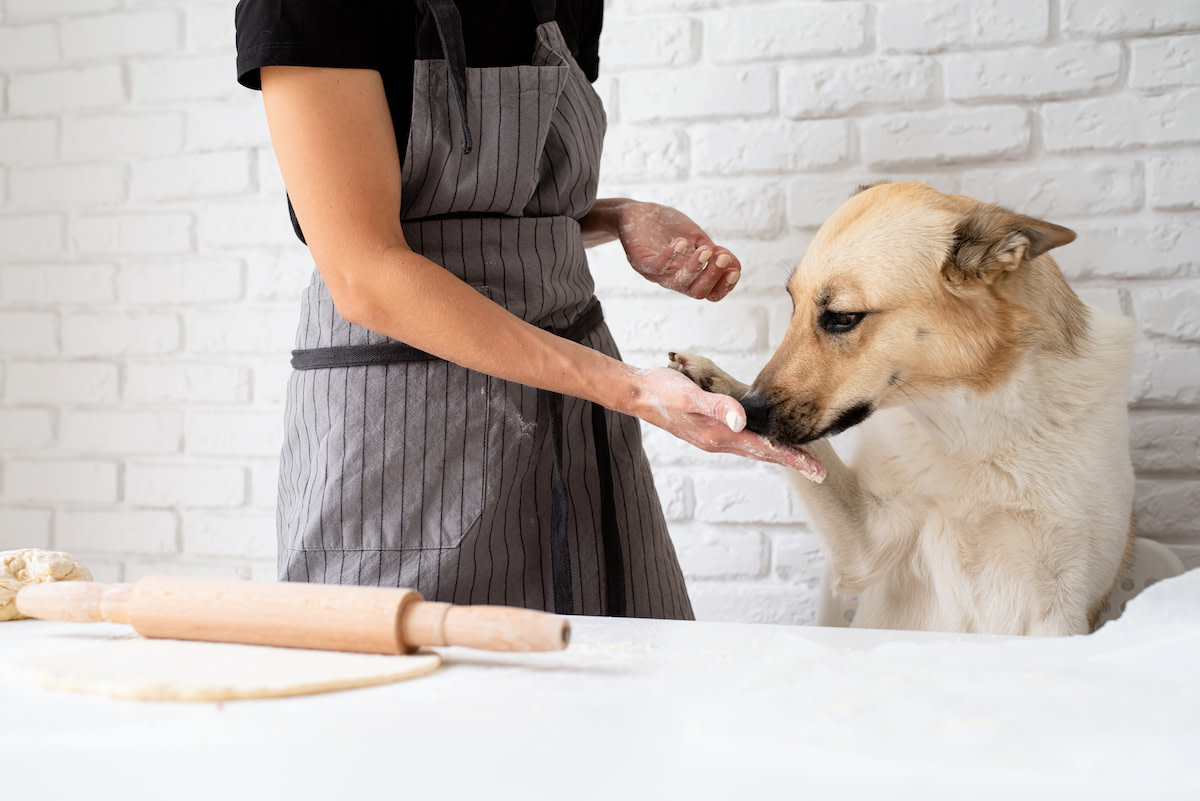Can Dogs Eat Flour? 10 Types of Flour Safe for Dogs
Written by MasterClass
Last updated: Jul 22, 2022 • 4 min read
Dogs can safely consume food products and treats containing flour. Learn about the different types of flour you can feed your dog.
Learn From the Best
Can Dogs Eat Flour?
Dogs can safely consume food products that contain flour. Flour is the powdery result of grinding wheat, corn, rice, or seeds (or dried roots like cassava). Most conventional flours come from wheat kernels (or wheat berries), which consist of an endosperm, a germ, and a bran. Dog treats made with flour can provide your pet with vitamins, nutrients, and fiber to support their digestive system. Whole wheat flour, oat flour, almond flour, and chickpea flour are popular types of flour for homemade dog treats.
Are There Health Risks of Feeding Flour to Dogs?
Before feeding flour to your dog, there are potential health risks to consider. Some dogs, like humans, are allergic or intolerant of certain flours, such as wheat. (Corn and soy are two other common allergens.) Introduce flour to your dog in small amounts before baking a whole batch of treats. Monitor your dog for stomach upset or intestinal blockage.
Be sure to feed flour to your pet in moderation. Consuming too much of a high-carb fiber food can cause bloating and lead to high cholesterol, high blood sugar, or other health issues for your dog.
10 Types of Flour Safe for Dogs to Eat
Choosing a suitable flour depends on your dog’s dietary needs and preferences. Consider the following types of flour safe for canines:
- 1. Almond flour: Made from almonds, this grain-free flour is rich in nutrients, fiber, and healthy fats and is low in carbohydrates. Almond flour treats may have trouble maintaining their shape. As with other nut flours, it's good to monitor your dog’s reaction and go slow when introducing it into your dog’s diet.
- 2. Brown rice flour: Brown rice flour is a gluten-free, whole grain flour. It contains calcium, folate, and zinc and is generally easy on the digestive system. It has a gritty texture and density, so mixing it with another flour when baking treats for your pup is best.
- 3. Buckwheat flour: This pseudo-grain has a distinctly nutty taste, and despite the name, buckwheat does not contain wheat. Instead, buckwheat is a fruit related to rhubarb and sorrel, harvested for its tiny triangular seeds. Buckwheat is rich in fiber, protein, vitamin B6, niacin, folate, copper, manganese, magnesium, phosphorus, potassium, and zinc. The flavor and texture may be off-putting to your pooch, but you can mix buckwheat flour with other flours when making dog treats.
- 4. Chickpea flour: Chickpea flour comes from chickpeas or garbanzo beans. This flour contains protein and nutrients like vitamins B6 and B9, manganese, magnesium, copper, zinc, and selenium. Flours made from roasted chickpeas tend to have a sweeter flavor, while those made with raw chickpeas can be bitter.
- 5. Coconut flour: Flour made from coconut is flavorful and nutrient-dense flour. It’s also low-carb, which can help your dog maintain a healthy weight. Coconut, a popular human food, contains fats, carbohydrates, proteins, and beneficial vitamins and minerals.
- 6. Oat flour: This popular whole grain flour is nutritionally dense, containing vitamin B1, folate, and phosphorus, among other nutrients. It is also relatively easy to digest, making it a good choice for homemade dog treats.
- 7. Quinoa flour: Quinoa flour is a gluten-free, fine powder consisting of dried quinoa seeds or quinoa flakes. Quinoa is a good source of complex carbohydrates for dogs with sensitivities to other high-carb foods like wheat. Quinoa also contains essential amino acids, calcium, B vitamins, vitamin E, magnesium, potassium, phosphorus, and linoleic acid (an essential fatty acid).
- 8. Sorghum flour: This grain has a slightly sweet, nutty flavor your canine companion might enjoy. This is a great choice for your pup because of the high levels of antioxidants and protein; however, it may be challenging to find on the shelf in your local grocery store.
- 9. White flour: White flour, also known as all-purpose flour or plain flour, comes from the starchy endosperm of the wheat berry. White flour does not contain germ or bran, so it is low in nutritional value, vitamins, minerals, and fiber. It is not the best choice for your dog (especially if they have a wheat allergy), but it will do in a pinch as an effective binder for some recipes.
- 10. Whole wheat flour: Whole wheat flour is the ground flour of whole wheat berries. It contains many nutrients, including vitamin E, iron, manganese, and copper. Dogs may have sensitivities to wheat, so introduce whole wheat flour slowly into your dog’s diet.
When selecting a flour for homemade dog treats, talk to your veterinarian. A vet can assess your dog’s health and provide information about common allergens for particular dog breeds.
Before Sharing With Your Pooch
Certain human foods can cause adverse reactions in canines, so always consult your veterinarian to determine whether it is safe to add these foods to your pet’s diet. This article is for educational and informational purposes and is not a substitute for medical or dietary advice.
Want to Learn More About Training the Goodest Boy or Girl?
Your dream of having a dog who understands words like “sit,” “stay,” “down,” and—crucially— “no” is just a MasterClass Annual Membership away. The only things you’ll need to train up a well-behaved pup are your laptop, a big bag of treats, and our exclusive instructional videos from superstar animal trainer Brandon McMillan.
